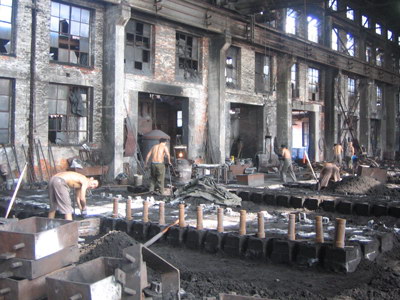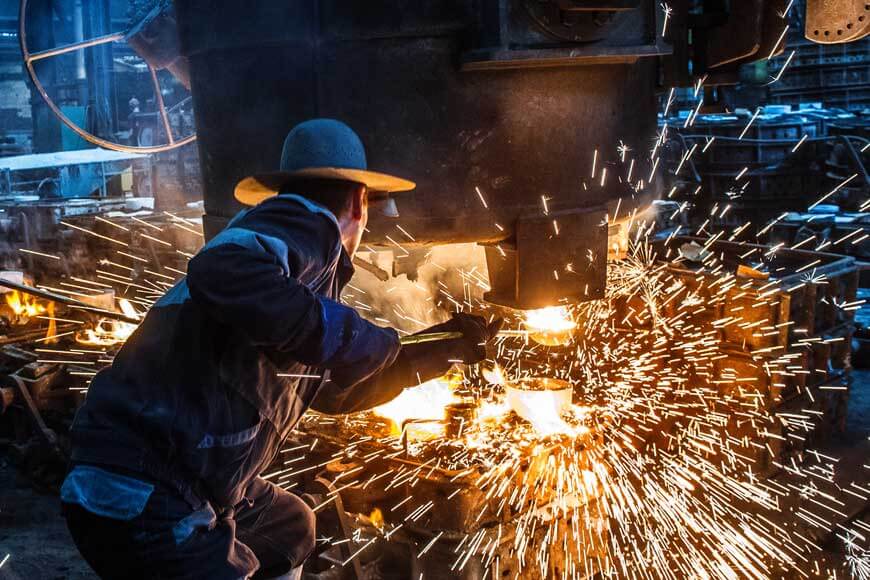Verification standards in Metal Casting that ensure durability and accuracy
Exactly How a Metal Foundry Adds To Sustainable Metal Manufacturing Practices
Metal foundries play a necessary duty in promoting sustainability within the metal production industry. By integrating recycled materials, they lower dependence on virgin resources and lessen environmental influences. Energy-efficient melting processes better minimize power consumption and discharges. The journey toward lasting methods involves more than just reusing and power management. It encompasses a wider dedication to honest sourcing and ingenious modern technologies. The effects of these methods are substantial and warrant closer examination.
The Role of Recycling in Metal Foundries
While metal manufacturing has traditionally depended on virgin products, the raising emphasis on sustainability has actually caused a substantial shift in practices, particularly in metal foundries. Recycling has actually arised as a vital element of this makeover, enabling foundries to repurpose scrap metal and decrease dependence on mined resources. By incorporating recycled materials right into their procedures, foundries not just lower environmental influence yet also reduced manufacturing prices.
The usage of recycled metals, such as light weight aluminum, copper, and steel, decreases power usage and decreases greenhouse gas discharges connected with typical mining and refining methods. Furthermore, foundries can achieve premium results by utilizing sophisticated sorting and handling modern technologies to ensure the purity of recycled materials. This emphasis on reusing fosters a circular economic situation, where waste is reduced, and sources are made use of efficiently. Consequently, metal foundries play a crucial role in advertising sustainable techniques within the metal production market.
Energy-Efficient Melting Techniques
Energy-efficient melting strategies are essential for improving sustainability in metal production. These techniques significantly lower energy usage during the melting procedure, which is among one of the most energy-intensive phases in metal production. Technologies such as induction melting, resistance heating, and microwave melting offer boosted efficiency compared to conventional approaches. Induction melting, as an example, makes use of electro-magnetic areas to generate warmth straight within the metal, lessening energy loss and providing exact temperature level control.
Furthermore, implementing warm recuperation systems can further enhance efficiency by recycling and catching waste warmth created throughout melting. Utilizing innovative insulation products and optimizing furnace layouts also add to energy cost savings. By adopting these cutting-edge melting strategies, metal foundries can lower their carbon impact, minimize functional expenses, and contribute to a much more lasting manufacturing landscape. The combination of energy-efficient practices not only straightens with environmental goals yet likewise meets the expanding need for accountable manufacturing approaches in the metal market.
Lasting Sourcing of Raw Materials
Lasting sourcing of basic materials is necessary for minimizing the environmental influence of metal manufacturing. This includes the raised application of recycled steels, the adoption of moral mining practices, and campaigns focused on local sourcing. By prioritizing these techniques, the market can advertise accountable source management and support regional economic climates.

Recycled Metal Use
How can sectors properly decrease their environmental influence while satisfying the growing need for metal? One considerable technique is the usage of recycled metal. By including scrap metal into their manufacturing procedures, foundries can decrease the removal of virgin materials, consequently saving natural sources and reducing energy consumption. Recycled metals call for less power to procedure contrasted to their raw equivalents, leading to lower greenhouse gas discharges. In addition, using recycled metal helps divert waste from landfills, advertising a circular economic climate. Industries that focus on recycled metal not only add to sustainability however likewise take advantage of cost savings linked with reduced material procurement. Recycled metal usage stands as an essential method for ecologically accountable metal manufacturing.
Moral Mining Practices
While the demand for steels remains to climb, industries are progressively recognizing the significance of moral mining techniques in guaranteeing responsible sourcing of basic materials. Moral mining incorporates a commitment to environmental stewardship, social duty, and adherence to fair labor techniques. Firms are now focusing on partnerships with mines that demonstrate transparency in their procedures, lessening eco-friendly influence and respecting neighborhood neighborhoods. This technique not just promotes a lasting supply chain but also improves the credibility of organizations involved. By executing extensive criteria and qualifications, industries can fight prohibited mining tasks and advertise the well-being of workers. Eventually, ethical mining practices add substantially to a more sustainable metal manufacturing ecological community, straightening financial development with environmental and social stability.
Local Sourcing Campaigns

Technologies in Metal Casting Processes
Innovations in metal casting procedures are changing the market by including innovative recycling techniques that lessen waste. Energy-efficient melting methods are likewise being developed to minimize power intake during production. In addition, the usage of cutting-edge mold and mildew materials contributes to improved performance and sustainability in casting procedures.
Advanced Recycling Techniques
Advanced recycling strategies are transforming metal casting procedures, substantially improving sustainability in the market. These technologies concentrate on recovering and recycling scrap metal, substantially lowering waste and the need for virgin products. Methods such as hydrometallurgy and pyrometallurgy allow foundries to remove beneficial steels from used parts, making sure reliable resource usage. Additionally, progressed sorting and filtration innovations boost the high quality of recycled steels, making them suitable for high-performance applications. This not just minimizes the ecological impact of metal production yet likewise fosters a round economy by promoting the reuse of products. As these reusing approaches remain to evolve, they guarantee to even more simplify operations within foundries and contribute to a much more sustainable metal production landscape.
Energy-Efficient Melting Methods
While traditional melting approaches have long been the backbone of metal casting, current developments have actually introduced energy-efficient methods that markedly reduce power usage and discharges. Technologies such as induction melting and electrical arc heaters have gained prestige, permitting for exact control over temperature level and lowering the need for fossil his explanation gas. These approaches not just boost power effectiveness yet likewise advertise quicker melting times, which translates to lower functional prices. Furthermore, technologies in warmth recuperation systems make it possible for foundries to catch and recycle excess official website warm generated throughout the melting process. This all natural method to energy management not just supports lasting methods yet likewise placements metal foundries as leaders in the shift towards greener manufacturing procedures, further lining up with worldwide sustainability goals.
Cutting-edge Mold Products
As the need for more sustainable and efficient metal casting procedures expands, the expedition of ingenious mold and mildew materials has actually ended up being a prime focus in the sector. Traditional mold and mildew materials typically contribute to environmental obstacles, prompting the look for choices that lower waste and power consumption. Current innovations consist of the advancement of eco-friendly binders and recyclable compounds, which not just enhance mold and mildew performance yet likewise lessen environmental influence. Furthermore, the use of 3D printing innovation in mold and mildew production allows for intricate styles that minimize material use and allow rapid prototyping. These innovative materials not only improve casting accuracy but additionally align with sustainability objectives, showcasing the market's dedication to decreasing its carbon footprint while preserving high-quality manufacturing requirements.
Minimizing Waste With Advanced Modern Technology
Cutting-edge innovations are transforming the metal manufacturing market by significantly decreasing waste and enhancing effectiveness. Advanced information analytics and artificial intelligence formulas enable foundries to optimize manufacturing procedures, recognizing inadequacies and lessening scrap material. Smart sensors check devices performance in real-time, enabling anticipating maintenance that reduces downtime and waste generation. In addition, additive production methods, such as 3D printing, permit the creation of complex components with minimal material usage, significantly lowering waste compared to conventional techniques.
Closed-loop systems are ending up being extra common, where scrap metal and byproducts are reused back into the production cycle, guaranteeing that materials are made use of to their greatest possibility. This assimilation of innovation not just advertises source preservation yet likewise improves the general sustainability of metal production practices. By embracing these improvements, foundries can add to an extra sustainable future while preserving competitiveness on the market
The Influence of Foundries on Carbon Impact Reduction
Foundries play a vital function in minimizing the carbon footprint of the metal production sector by applying numerous lasting methods. By making use of energy-efficient modern technologies, such as electric arc furnaces, these centers substantially lower greenhouse gas exhausts contrasted to standard approaches. Furthermore, foundries increasingly embrace eco-friendly power resources, which additionally diminishes their dependence on nonrenewable fuel sources.
Recycling scrap metal is an additional crucial practice that foundries utilize, saving find resources and reducing the requirement for virgin products. This not only lessens waste yet also reduces the energy-intensive extraction procedures connected with mining. Furthermore, the adoption of closed-loop water systems aids to minimize water usage and reduce wastewater discharge, adding to an extra lasting operation.
With these initiatives, foundries show their commitment to ecological stewardship, causing a significant reduction in the overall carbon footprint of the metal production industry. Their recurring initiatives are crucial in the change towards a much more sustainable industrial landscape.
Regularly Asked Inquiries
What Kinds of Metals Are A Lot Of Commonly Recycled in Foundries?
Light weight aluminum, steel, copper, and brass are among one of the most typically recycled steels in foundries. These metals are favored due to their high recycling rates, financial value, and prevalent accessibility, adding considerably to commercial sustainability efforts.
Exactly How Do Foundries Make Certain the Top Quality of Recycled Materials?
Foundries establish the high quality of recycled materials via extensive screening, arranging, and filtration procedures. They execute advanced modern technologies to assess structure and remove contaminations, guaranteeing that the recycled metals fulfill sector requirements for performance and safety.
What Qualifications Exist for Sustainable Foundry Practices?
Different certifications exist for sustainable foundry methods, consisting of ISO 14001 for environmental management, ISO 50001 for energy monitoring, and LEED certification for lasting building techniques (Aluminum Foundry). These qualifications assist assure adherence to environmental and sustainability criteria in procedures
Exactly How Do Foundries Gauge Their Carbon Footprint Decrease?
Foundries gauge carbon footprint decrease with devices like lifecycle evaluations, energy audits, and emissions tracking systems. They compare standard emissions to current outcomes, evaluating renovations in power effectiveness, material usage, and sustainable energy fostering with time.
What Are the Financial Benefits of Lasting Metal Manufacturing?
Lasting metal manufacturing uses financial advantages such as lowered functional prices, raised efficiency, boosted market competition, and possible federal government motivations. In addition, it cultivates advancement and attracts environmentally aware consumers, ultimately driving long-term success for organizations.
Metal foundries play an essential duty in promoting sustainability within the metal manufacturing industry. While metal manufacturing has commonly depended on virgin products, the boosting focus on sustainability has actually led to a substantial shift in methods, particularly in metal foundries. By incorporating scrap metal right into their production processes, foundries can decrease the removal of virgin products, therefore lowering and saving all-natural resources energy usage. Foundries play an important duty in lowering the carbon footprint of the metal production market by implementing different lasting methods. Recycling scrap metal is an additional critical method that foundries employ, preserving sources and minimizing the requirement for virgin products.